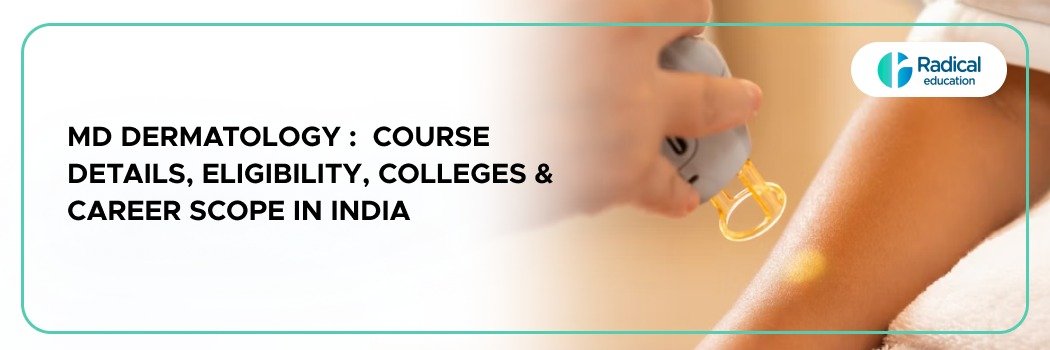

MD Dermatology: Course Details, Eligibility, Colleges & Career Scope in India
MD Dermatology is a 3-year postgraduate medical degree for licensed physicians who want to specialize in the diagnosis, treatment, and management of conditions which affects the skin, hair, nails, and mucous membranes. In many countries like India, the curriculum also includes Venereology and Leprosy.
PG Diploma in Dermatology
It is a postgraduate program for medical professionals which is focused on the diagnosis and treatment of skin, hair, and nail disorders. It takes 1-2 years which covers both medical and surgical aspects covering common conditions like acne, cosmetic procedures, dermatopathology, and therapies like lasers. Graduates can work in hospitals, clinics, or private practice as dermatologists.

MD Dermatology after MBBS
An M.D. in Dermatology Admission is competitive and typically requires a high rank on the NEET-PG entrance exam. The curriculum includes a mix of medical and surgical training, covering a wide range of conditions from acne and eczema to cosmetic procedures like laser therapy.
- Duration for the course is 3 years
- It specialized in the study of hair, nails, skin, and its diseases. It often includes Venereology and Leprosy.
- The curriculum combines theoretical learning with practical and clinical training, including rotations in hospitals and clinics.
- Advanced clinical skills for medical and aesthetic concerns, as well as procedural expertise like biopsies and laser therapy.
MD Dermatology eligibility
- A Bachelor of Medicine and Bachelor of Surgery degree is required.
- An Entrance Test for Postgraduate (NEET-PG) is necessary for admission.
- A minimum of 50% in the M.B.B.S. degree is often required.
MD Dermatology salary
- An MD in Dermatology salary in India can range from an entry-level salary of approximately ₹8–20 LPA to over ₹1 crore per year for experienced professionals in private practice.
- The average annual salary is around ₹22.1 lakhs, but this can vary significantly based on experience, specialization, location, and the sector .

MD in Dermatology venereology and leprosy
An MD in Dermatology, Venereology, and Leprosy is a three-year postgraduate program focused on the diagnosis and treatment of skin, hair, nail, and sexually transmitted diseases, including leprosy. The curriculum is a combination of theoretical knowledge with hands-on training in clinical settings to cover a comprehensive range of dermatological issues which starts from common conditions like eczema to more complex diseases.
MD in dermatology colleges
Some of the Top medical colleges for MD in Dermatology
- All India Institute of Medical Sciences (AIIMS), New Delhi is ranked among the top, both for dermatology and overall medical education.
- Post Graduate Institute of Medical Education and Research, Chandigarh is a highly-regarded institution for postgraduate medical studies.
- Maulana Azad Medical College, Delhii is also a prominent government medical college in Delhi with a strong dermatology program.
- Seth GS Medical College and KEM Hospital, Mumbai is a leading institution in Mumbai for medical education and training.
- Vardhman Mahavir Medical College (VMMC) and Safdarjung Hospital, New Delhi is a well-regarded government college in Delhi with a strong reputation.
- King George’s Medical University (KGMU), Lucknow is a popular and well-known medical university in Uttar Pradesh.
- Christian Medical College (CMC), Vellore is another top-ranked institution for MD in Dermatology in India.
- University College of Medical Sciences (UCMS), Delhi is said to be a popular choice for dermatology in the Delhi NCR region.

Conclusion
In conclusion, it can be said an MD in Dermatology is a comprehensive graduate degree that provides a foundation for a diverse and evolving career, allowing for specialization in various fields like cosmetics, surgery, pediatric dermatology, or dermatopathology. The field offers a mix of clinical medicine, entrepreneurship, and research, with a growing demand fueled by both medical skin conditions and aesthetic consciousness, though ongoing professional development through fellowships and focused courses is crucial to meet advanced patient expectations and stay current in the rapidly changing landscape.

FAQs
What are the eligibility criteria?
MBBS degree with completion of internship and qualifying NEET-PG or equivalent entrance exam.
What does a dermatologist do?
Diagnoses and treats skin disorders, performs cosmetic procedures, and manages hair and nail conditions.
What are common career options after MD Dermatology?
- Clinical dermatologist
- Cosmetologist
- Trichologist
- Academician





